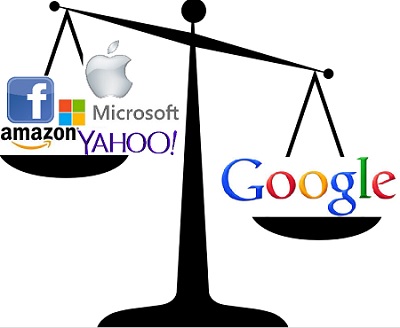Google Is Being Sued Over Claims Of Secret Deals It Made With Android Device Makers
A federal class action suit charges that Google’s deals with certain Android device makers hurt competition and violate antitrust laws.
Google has been sued for forcing device manufacturers into making its search engine the default on Android devices, which drives up the cost for customers
A lawsuit filed Thursday accuses Google of strong-arming device manufacturers into making its search engine the default on Android devices, driving up the cost of those devices and hurting consumers.
The consumer class-action complaint, filed in U.S. District Court for the Northern District of California, alleges Google does that by making secret agreements with manufacturers that also require applications such as YouTube and Google Play store to occupy prime real estate on the devices’ screens.
bloomberg.comIt argues device manufacturers enter such secret pacts with Google because they know consumers expect to see a full suite of Google apps when they buy a device
The suit, brought on behalf of two consumers as well as other Android device makers, says that the Mobile Application Distribution Agreements that Google has with device makers that use its Gmail, YouTube and other proprietary apps hurt competition.
“Google’s MADAs are contracts in restraint of trade that are designed to maintain and extend its monopolies in general search and handheld general search,” according to the lawsuit. “Simply put, there is no lawful, pro-competitive reason for Google to condition licenses to pre-load popular Google apps on making its search product the default search engine on covered devices.
The suit does not argue that device manufacturers entered MADAs involuntarily, but that the market power of Google compels them to
“Because consumers want access to Google’s products, and due to Google’s power in the U.S. market for general handheld search, Google has unrivaled market power over smartphone and tablet manufacturers,” says the suit, brought by Gary Feitelson of Louisville, Kentucky, and Daniel McKee of Des Moines, Iowa.
bloomberg.comGoogle’s expansion of its monopoly in search on smartphones, which helps through paid search-related advertisements to generate billions of dollars of profit a year, is “not merely a function of having built a better search engine,” according to yesterday’s complaint on behalf of consumers. The “secret” MADAs require that each Android device maker “pre-loads onto prime screen real estate all of the apps in the suite, whether the manufacturer wants them or not,” according to the complaint.
The Android devices would be cheaper if Google's rivals could compete for the same status on devices
Android devices would be cheaper if Google’s rivals could compete for the same status on devices by paying device manufacturers for such positioning, the lawsuit argues.
The lawsuit includes two exhibits of MADAs, one with Samsung Electronics and the other with HTC, both dated as effective Jan. 1, 2011. Both documents were trial exhibits made public during litigation between Oracle and Google, the lawsuit says
bloomberg.comIn an emailed statement, a Google spokesman said:
“Anyone can use Android without Google and anyone can use Google without Android. Since Android’s introduction, greater competition in smartphones has given consumers more choices at lower prices.”
bloomberg.comThe suit argues that the two consumers overpaid for both an HTC EVO 3D mobile phone and a Samsung Galaxy SIII device because of MADAs
It also says the plaintiffs would have experienced better search options without such agreements. Consumers, the lawsuit contends, “do not know how to switch, nor will they go to the trouble of switching, the default search engine on their devices.”
Google has faced scrutiny from regulators in the European Union and United States over how it promotes its own services
In February, Google settled an antitrust case with the European Commission, agreeing to give greater visibility to search results of services that rival its own and make images associated with rival links more prominent. In January 2013, Google resolved an antitrust complaint filed with the U.S. Federal Trade Commission.
bloomberg.comGoogle agreed to make some changes to how advertisers could manage their campaigns across competing platforms. It also agreed to refrain from misappropriating content from vertical services, such as shopping and travel, that compete with its own offerings.



